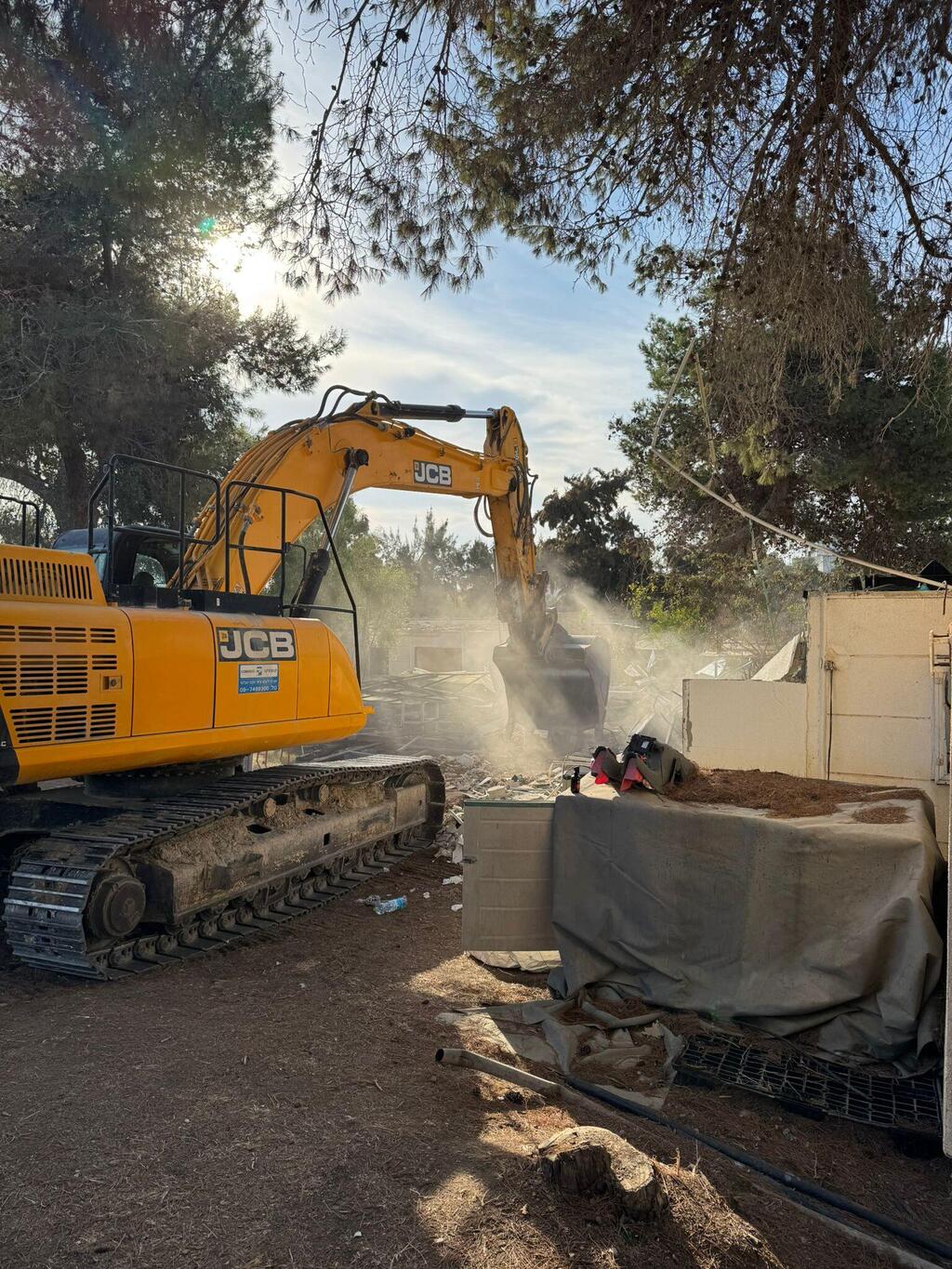Getting your Trinity Audio player ready...
Fourteen months after the tragic events of October 7, demolition and reconstruction efforts have begun in Kibbutz Kfar Aza as part of a government-funded recovery initiative led by the Tkuma Directorate. The comprehensive restoration plan includes repairs to 400 structures – 360 residential buildings and 40 public facilities – as well as infrastructure damaged during the Gaza War. Additionally, 97 buildings are slated for demolition, including 48 in the young people's neighborhood, where a final decision on their fate is still pending.
The decision to rehabilitate Kfar Aza has not been without challenges, as kibbutz members struggled to reach a consensus. Ultimately, an agreement was reached, and state-funded restoration efforts are now underway. Most residents of Kfar Aza are currently living in temporary housing in Kibbutz Ruhama, while at least 100 others are staying in Kibbutz Shefayim. It remains unclear how many families will return to Kfar Aza, a place that bore the brunt of the October 7 attacks.
The restoration of Kibbutz Kfar Aza is part of a broader recovery program led by the Tkuma Directorate, with an estimated total budget of $390 million
The Tkuma Directorate has allocated approximately $52 million for the restoration plan, which includes demolishing and rebuilding private and kibbutz-owned homes, constructing a new young people's neighborhood in a different location, and repairing public infrastructure damaged during the war. The plan also involves creating new public facilities, establishing a new residential neighborhood, and upgrading public buildings, sports facilities and recreation centers. To manage the project, the kibbutz has partnered with the management firm A. Epstein & Sons Ltd.
In recent months, the Brothers in Arms organization, along with volunteers, has already begun renovating parts of the kibbutz where homes were damaged but did not require complete demolition. However, full-scale reconstruction from the ground up is a complex task that only the government can undertake.
A demolished home in Kfar Aza
The restoration plan for Kibbutz Kfar Aza was developed in collaboration with the kibbutz community. As part of a broader vision for recovery and independence, the Tkuma Directorate’s framework emphasizes community-led execution. This approach expands the existing compensation mechanism through the Israel Property Tax Fund, increasing it by up to 400% to address the unique circumstances and severe impact of the Gaza War on the kibbutzim and surrounding communities.
Following a request from Yossi Sheli, head of the Tkuma Directorate, to Rabbi Natan Elnatan, chairman of the National Planning and Building Council, the kibbutz’s application for a permit exemption was approved. The permit allows for the construction of a neighborhood with 55 single-family homes, a new young people's zone with 60 housing units, a public building and a shared workspace. The plan also includes demolishing existing structures, relocating three portable residential units, and rebuilding 41 housing units and one public building across 29 damaged structures. Additional work includes paving roads, creating parking lots, developing open spaces, upgrading infrastructure and modifying existing buildings.
Among the communities in the Tkuma region, a unique financial arrangement was developed for 10 kibbutzim, including Kfar Aza, Be’eri, Nir Oz, Nirim, Re’im, Kerem Shalom, Ein HaShlosha, Holit, Kissufim and Nahal Oz. This agreement, made between the Tkuma Directorate and the Israel Property Tax Fund in collaboration with kibbutz leadership, eliminates the need for individual claims to the tax fund. Instead, the allocated budget for restoration is comprehensive and includes settlements with the Property Tax Fund. This arrangement reduces bureaucracy and provides flexibility for the kibbutzim to tailor their recovery and rebuilding plans to the needs of their communities.
2 View gallery


Faculty and representatives from the University of Pennsylvania tour Kibbutz Kfar Aza
(Photo: Amir Cohen / Reuters)
The restoration of Kibbutz Kfar Aza is part of a broader recovery program led by the Tkuma Directorate, with an estimated total budget of $390 million. All the kibbutzim in the region have joined the initiative, each at various stages of planning, approval, and implementation.
Get the Ynetnews app on your smartphone: Google Play: https://bit.ly/4eJ37pE | Apple App Store: https://bit.ly/3ZL7iNv
"On the anniversary of the October 7 attacks and the outbreak of the Gaza War, the vast majority of the kibbutzim in the Tkuma region have begun implementing local recovery plans, despite numerous challenges," the Tkuma Directorate stated. These challenges include the ongoing conflict, security concerns, the relocation of communities to temporary housing, debris removal, and the emotional toll and uncertainty faced by communities, some of which still have members held in captivity.
"The Tkuma Directorate will continue to work alongside the communities of the region to ensure recovery, development, and prosperity," the statement concluded.






